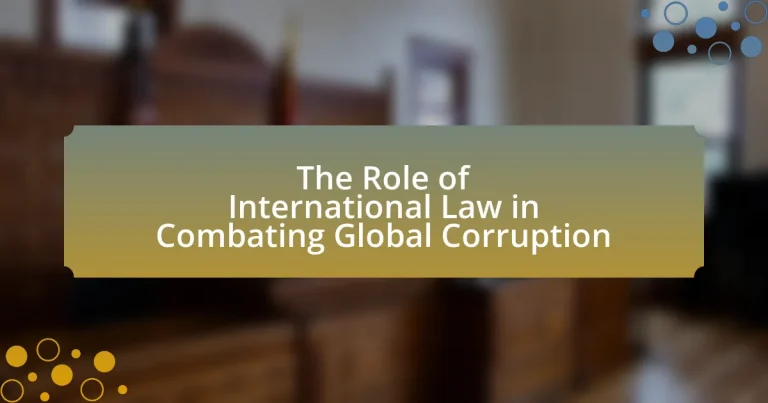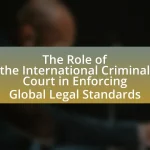The article examines the critical role of international law in combating global corruption, highlighting frameworks such as the United Nations Convention against Corruption (UNCAC) that facilitate cooperation, accountability, and enforcement among nations. It defines corruption on a global scale, discusses key international legal instruments, and addresses the challenges of cross-border corruption. The article also explores how international treaties promote collaboration, the mechanisms for enforcing anti-corruption laws, and the influence of international standards on national legislation. Additionally, it outlines the benefits of aligning domestic laws with international frameworks and the economic advantages of reducing corruption, while acknowledging the limitations and criticisms of international legal approaches.
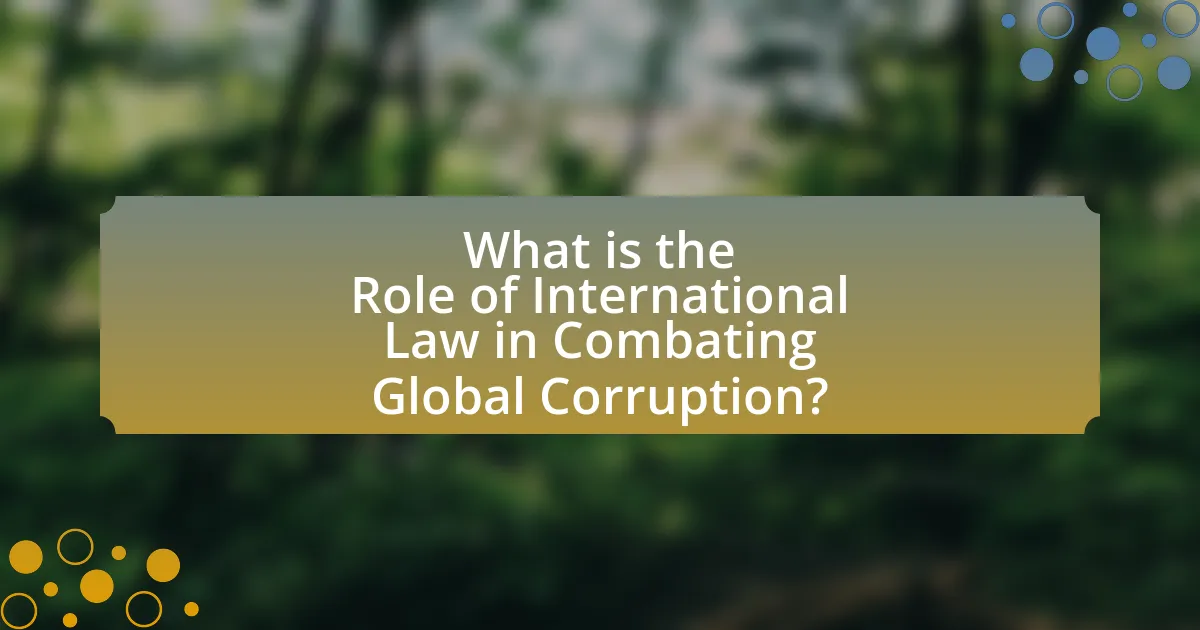
What is the Role of International Law in Combating Global Corruption?
International law plays a crucial role in combating global corruption by establishing frameworks for cooperation, accountability, and enforcement among nations. Treaties such as the United Nations Convention against Corruption (UNCAC) provide legal standards and guidelines for countries to adopt anti-corruption measures, promote transparency, and facilitate the exchange of information. Additionally, international law enables the prosecution of corrupt practices across borders, as seen in cases where countries collaborate to investigate and prosecute corruption-related offenses. The effectiveness of these legal instruments is evidenced by the increased number of countries implementing anti-corruption legislation and participating in international monitoring mechanisms, which collectively strengthen global efforts to reduce corruption.
How does international law define corruption on a global scale?
International law defines corruption on a global scale as the abuse of entrusted power for private gain, encompassing acts such as bribery, embezzlement, and money laundering. This definition is supported by various international treaties and conventions, including the United Nations Convention against Corruption (UNCAC), which outlines specific forms of corruption and establishes a framework for international cooperation in combating these offenses. The UNCAC, adopted in 2003, emphasizes the need for countries to implement measures to prevent corruption, promote transparency, and enhance accountability, thereby reinforcing the global commitment to address corruption effectively.
What are the key international legal instruments addressing corruption?
The key international legal instruments addressing corruption include the United Nations Convention against Corruption (UNCAC), the OECD Anti-Bribery Convention, and the Council of Europe’s Criminal Law Convention on Corruption. The UNCAC, adopted in 2003, is the first global legally binding anti-corruption instrument, promoting measures to prevent corruption and criminalizing various forms of corruption. The OECD Anti-Bribery Convention, established in 1997, focuses on combating bribery of foreign public officials in international business transactions, requiring signatory countries to implement laws against such practices. The Council of Europe’s Criminal Law Convention on Corruption, effective since 2005, aims to harmonize laws across Europe to combat corruption in both the public and private sectors. These instruments collectively provide a framework for international cooperation and legal standards to combat corruption effectively.
How do definitions of corruption vary across different jurisdictions?
Definitions of corruption vary significantly across different jurisdictions, influenced by cultural, legal, and political contexts. For example, in the United States, corruption is often defined through legal frameworks such as the Foreign Corrupt Practices Act, which specifically addresses bribery of foreign officials. In contrast, countries like Denmark and New Zealand, which consistently rank high on transparency indices, define corruption more broadly, encompassing not only bribery but also nepotism and abuse of power. Furthermore, the United Nations Convention Against Corruption provides a global framework but allows countries to adapt definitions to their specific legal systems, leading to variations in enforcement and interpretation. This divergence highlights the complexities of addressing corruption on an international scale, as differing definitions can impact the effectiveness of anti-corruption measures.
Why is international cooperation essential in combating corruption?
International cooperation is essential in combating corruption because corruption often transcends national borders, making it a global issue that requires collective action. When countries collaborate, they can share intelligence, resources, and best practices, which enhances their ability to detect and prosecute corrupt activities. For instance, the United Nations Convention Against Corruption, adopted in 2003, emphasizes the importance of international cooperation in asset recovery and mutual legal assistance, demonstrating that coordinated efforts can lead to more effective enforcement and accountability. Additionally, according to Transparency International, countries that engage in international partnerships are more successful in reducing corruption levels, as they can leverage international norms and standards to strengthen their domestic anti-corruption frameworks.
What are the challenges of cross-border corruption?
Cross-border corruption presents significant challenges, including jurisdictional issues, differing legal frameworks, and lack of cooperation among nations. Jurisdictional issues arise when corrupt activities span multiple countries, complicating enforcement actions and legal proceedings. Differing legal frameworks can lead to inconsistencies in how corruption is defined and prosecuted, making it difficult to achieve uniformity in combating these crimes. Additionally, lack of cooperation among nations often results in inadequate information sharing and coordination, hindering effective investigations and prosecutions. According to the United Nations Office on Drugs and Crime, these challenges contribute to the persistence of corruption on a global scale, undermining efforts to promote transparency and accountability.
How do international treaties facilitate cooperation among nations?
International treaties facilitate cooperation among nations by establishing legally binding agreements that outline mutual obligations and standards for behavior. These treaties create a framework for collaboration on various issues, including trade, environmental protection, and anti-corruption measures. For instance, the United Nations Convention Against Corruption, adopted in 2003, provides a comprehensive approach to combating corruption through international cooperation, mutual legal assistance, and the adoption of effective measures by signatory countries. This treaty exemplifies how nations can work together to address shared challenges, enhance transparency, and promote accountability, thereby fostering a cooperative international environment.
What mechanisms exist for enforcing international anti-corruption laws?
International anti-corruption laws are enforced through various mechanisms, including treaties, international organizations, and national legislation. Treaties such as the United Nations Convention Against Corruption (UNCAC) provide a framework for countries to adopt anti-corruption measures and cooperate in enforcement. International organizations like the OECD and the World Bank promote compliance through peer reviews and funding conditionality. Additionally, national laws that align with international standards enable countries to prosecute corruption effectively, supported by mutual legal assistance treaties that facilitate cross-border cooperation in investigations and prosecutions. These mechanisms collectively enhance accountability and promote adherence to anti-corruption norms globally.
How do international organizations monitor compliance with anti-corruption measures?
International organizations monitor compliance with anti-corruption measures through a combination of assessments, reporting mechanisms, and peer reviews. For instance, the United Nations Convention against Corruption (UNCAC) establishes a framework for countries to report on their anti-corruption efforts, which are then evaluated by the Implementation Review Group. Additionally, organizations like the OECD utilize mutual evaluations to assess member countries’ adherence to anti-bribery conventions, providing detailed reports that highlight compliance levels and areas needing improvement. These structured processes ensure accountability and facilitate the sharing of best practices among nations, reinforcing the global commitment to combat corruption effectively.
What role do non-governmental organizations play in enforcing these laws?
Non-governmental organizations (NGOs) play a crucial role in enforcing international laws aimed at combating global corruption by monitoring compliance, advocating for policy changes, and providing legal assistance. NGOs such as Transparency International and Global Witness actively engage in research and reporting on corruption cases, which helps to hold governments and corporations accountable. For instance, Transparency International’s Corruption Perceptions Index provides a measurable assessment of corruption levels in various countries, influencing public policy and international relations. Additionally, NGOs often collaborate with international bodies to promote anti-corruption frameworks, thereby enhancing the enforcement of these laws through grassroots mobilization and public awareness campaigns.
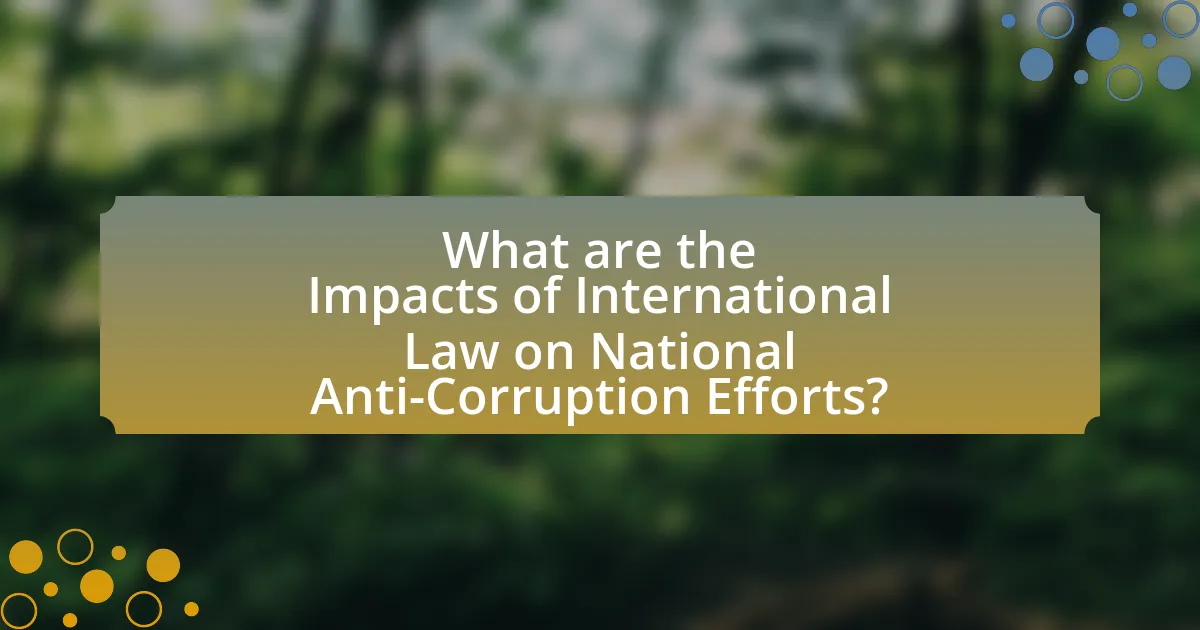
What are the Impacts of International Law on National Anti-Corruption Efforts?
International law significantly influences national anti-corruption efforts by establishing frameworks for cooperation, setting standards for governance, and promoting accountability. For instance, treaties such as the United Nations Convention Against Corruption (UNCAC) provide guidelines that countries can adopt to enhance their legal and institutional frameworks against corruption. These international agreements encourage nations to implement anti-corruption measures, share best practices, and engage in mutual legal assistance, thereby strengthening their domestic laws. Furthermore, compliance with international law can lead to increased foreign investment, as investors often seek stable environments with robust anti-corruption measures. Studies have shown that countries adhering to international anti-corruption standards experience improved governance and reduced corruption levels, demonstrating the tangible impacts of international law on national efforts.
How do international laws influence domestic legislation against corruption?
International laws significantly influence domestic legislation against corruption by establishing frameworks and standards that countries are encouraged to adopt. For instance, treaties such as the United Nations Convention Against Corruption (UNCAC) provide guidelines for member states to implement anti-corruption measures, which often leads to the revision of national laws to align with these international commitments. Countries that ratify such treaties typically enhance their legal frameworks to include stricter penalties for corrupt practices, improve transparency in public procurement, and establish mechanisms for international cooperation in corruption investigations. This alignment is evidenced by the fact that many nations have enacted or amended laws in response to their obligations under UNCAC, demonstrating a direct correlation between international legal standards and domestic anti-corruption legislation.
What examples exist of countries reforming laws due to international pressure?
Countries such as South Africa and Myanmar have reformed laws due to international pressure. South Africa, facing scrutiny from global organizations and foreign governments, enacted the Prevention and Combating of Corrupt Activities Act in 2004 to address corruption more effectively. Similarly, Myanmar, under pressure from the international community, made significant legal changes in 2015, including the Anti-Corruption Law, to improve governance and attract foreign investment. These reforms illustrate how international advocacy can lead to legislative changes aimed at combating corruption.
How do international standards shape national anti-corruption strategies?
International standards shape national anti-corruption strategies by providing a framework for legal and institutional reforms that countries can adopt to combat corruption effectively. These standards, such as the United Nations Convention Against Corruption (UNCAC), establish benchmarks for transparency, accountability, and integrity in governance. For instance, UNCAC encourages nations to implement measures like asset recovery, whistleblower protection, and public procurement reforms, which have been adopted by various countries to enhance their anti-corruption efforts. The adoption of these international norms not only facilitates cooperation among nations but also promotes best practices that can lead to more effective anti-corruption policies at the national level.
What are the benefits of aligning national laws with international anti-corruption frameworks?
Aligning national laws with international anti-corruption frameworks enhances legal consistency and strengthens enforcement mechanisms against corruption. This alignment facilitates cooperation among countries, enabling them to share information and best practices, which is crucial for effectively combating transnational corruption. For instance, the United Nations Convention Against Corruption (UNCAC) provides a comprehensive framework that encourages nations to adopt measures such as criminalizing bribery and promoting transparency in public procurement. Countries that align their laws with such frameworks often experience improved governance, increased foreign investment, and enhanced public trust, as evidenced by the World Bank’s findings that countries with robust anti-corruption measures tend to have better economic performance and social stability.
How does compliance enhance a country’s global standing?
Compliance enhances a country’s global standing by demonstrating adherence to international laws and norms, which fosters trust and credibility among nations. When a country complies with international regulations, such as anti-corruption treaties and human rights agreements, it signals its commitment to ethical governance and rule of law. This commitment can lead to increased foreign investment, as investors seek stable environments with predictable legal frameworks. For example, countries that ratified the United Nations Convention Against Corruption have seen improvements in their international reputation, which can result in enhanced diplomatic relations and access to international aid. Thus, compliance not only strengthens a nation’s legal and ethical framework but also elevates its status on the global stage.
What economic benefits arise from reducing corruption through international law?
Reducing corruption through international law leads to significant economic benefits, including increased foreign direct investment (FDI) and enhanced economic growth. When corruption is minimized, countries become more attractive to investors, as transparent legal frameworks and predictable business environments reduce risks associated with bribery and fraud. For instance, the World Bank estimates that countries with lower corruption levels can experience up to a 5% increase in GDP growth due to improved investor confidence and economic stability. Furthermore, reduced corruption can lead to more efficient allocation of resources, as funds that would otherwise be siphoned off through corrupt practices can be redirected towards public services and infrastructure development, ultimately fostering sustainable economic development.
What are the limitations of international law in addressing corruption?
International law has significant limitations in addressing corruption, primarily due to its reliance on state sovereignty and the lack of enforceable mechanisms. States often prioritize national interests over international obligations, leading to inconsistent implementation of anti-corruption measures. For instance, the United Nations Convention against Corruption (UNCAC) lacks binding enforcement power, meaning that compliance is voluntary and varies widely among countries. Additionally, the absence of a centralized authority to investigate and prosecute corruption cases across borders hampers effective action. These limitations are evident in the varying levels of commitment and effectiveness in anti-corruption efforts among member states, which undermines the overall impact of international law in combating corruption globally.
How do sovereignty issues affect the enforcement of international anti-corruption laws?
Sovereignty issues significantly hinder the enforcement of international anti-corruption laws by limiting the ability of foreign entities to intervene in a nation’s internal affairs. Countries often prioritize their sovereignty, leading to resistance against external pressures or interventions aimed at enforcing anti-corruption measures. For instance, the United Nations Convention Against Corruption (UNCAC) relies on member states to implement its provisions domestically, but nations may refuse to cooperate due to concerns over national sovereignty, as seen in cases where governments have rejected foreign investigations or assistance. This reluctance can result in a lack of accountability and ineffective enforcement of anti-corruption laws, ultimately undermining global efforts to combat corruption.
What are the criticisms of international legal frameworks in combating corruption?
International legal frameworks in combating corruption face several criticisms, primarily regarding their effectiveness and enforcement. Critics argue that these frameworks often lack binding authority, leading to inconsistent implementation across countries. For instance, the United Nations Convention Against Corruption (UNCAC) has been criticized for its reliance on voluntary compliance, which results in varying levels of commitment among signatory states. Additionally, the frameworks may not adequately address the root causes of corruption, such as political instability and lack of transparency, limiting their overall impact. Furthermore, enforcement mechanisms are often weak, with insufficient resources allocated for monitoring and accountability, which undermines the frameworks’ intended goals. These criticisms highlight significant gaps in the international legal approach to effectively combat corruption on a global scale.
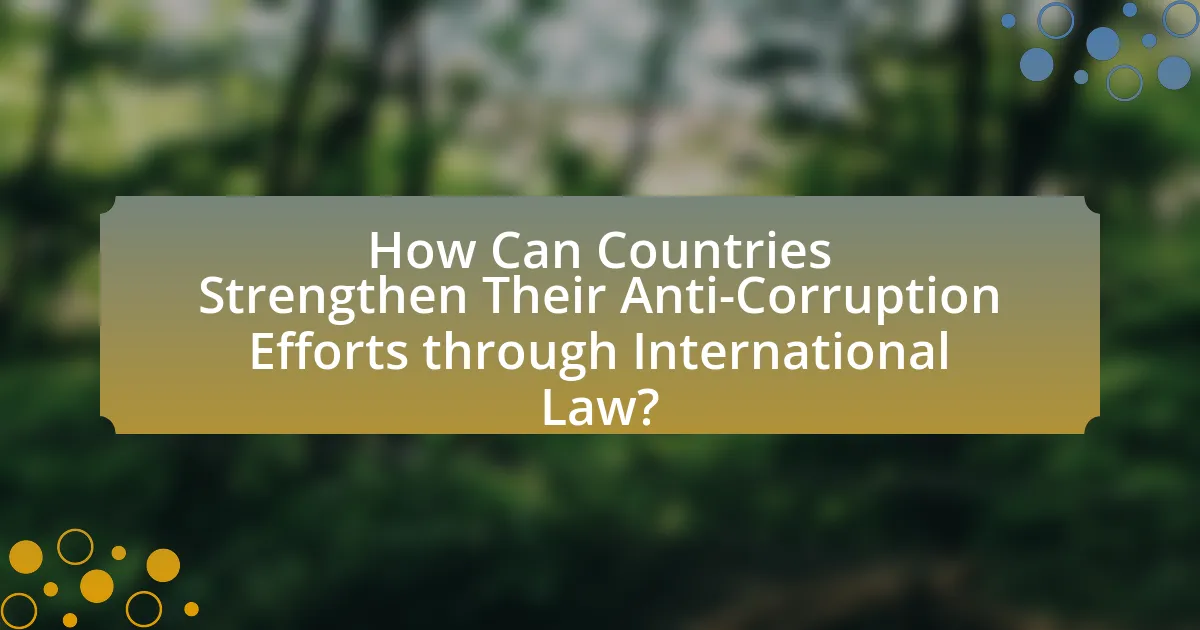
How Can Countries Strengthen Their Anti-Corruption Efforts through International Law?
Countries can strengthen their anti-corruption efforts through international law by ratifying and implementing treaties such as the United Nations Convention Against Corruption (UNCAC). This treaty provides a comprehensive framework for countries to adopt measures that promote transparency, accountability, and integrity in public administration. By aligning national laws with international standards, countries can enhance cooperation in investigations and prosecutions of corruption-related offenses. For instance, the UNCAC encourages the establishment of independent anti-corruption bodies and the adoption of effective whistleblower protection laws, which have been shown to reduce corruption levels in various jurisdictions.
What best practices can nations adopt to enhance compliance with international anti-corruption standards?
Nations can enhance compliance with international anti-corruption standards by implementing robust legal frameworks, promoting transparency, and fostering accountability. Establishing comprehensive anti-corruption laws aligned with international conventions, such as the United Nations Convention Against Corruption, ensures that nations have the necessary legal tools to combat corruption effectively. Additionally, adopting measures such as public access to government information and mandatory disclosure of assets for public officials increases transparency, which is crucial for deterring corrupt practices. Furthermore, creating independent anti-corruption agencies with the authority to investigate and prosecute corruption cases reinforces accountability. According to the Transparency International Corruption Perceptions Index, countries with strong legal frameworks and transparency measures tend to score higher in anti-corruption efforts, demonstrating the effectiveness of these best practices.
How can countries improve transparency and accountability in governance?
Countries can improve transparency and accountability in governance by implementing robust legal frameworks that promote open data initiatives and enforce anti-corruption laws. For instance, the adoption of the United Nations Convention Against Corruption (UNCAC) provides a comprehensive legal basis for countries to enhance their governance structures. This convention encourages member states to establish measures for public access to information, which has been shown to reduce corruption levels significantly. According to a study by Transparency International, countries that have enacted strong freedom of information laws experience higher levels of public trust and lower instances of corrupt practices. Additionally, regular audits and independent oversight bodies can further ensure that government actions are transparent and accountable to the public.
What role does public participation play in strengthening anti-corruption measures?
Public participation plays a crucial role in strengthening anti-corruption measures by enhancing transparency and accountability in governance. When citizens engage in decision-making processes, they can hold public officials accountable, thereby reducing opportunities for corrupt practices. Research indicates that countries with higher levels of public engagement in governance tend to experience lower levels of corruption. For instance, the World Bank’s 2017 report highlights that participatory budgeting initiatives in Brazil led to a significant decrease in corruption levels, demonstrating the effectiveness of public involvement in promoting integrity and oversight.
How can international collaboration be fostered to combat corruption effectively?
International collaboration can be fostered to combat corruption effectively through the establishment of binding international treaties and agreements that promote transparency and accountability among nations. For instance, the United Nations Convention against Corruption (UNCAC) provides a comprehensive framework for countries to cooperate in preventing corruption, facilitating mutual legal assistance, and promoting the adoption of effective anti-corruption measures. Additionally, regular international forums and conferences can enhance dialogue and share best practices, as evidenced by the Global Forum on Asset Recovery, which focuses on the recovery of stolen assets through international cooperation. These mechanisms create a structured approach for nations to work together, share information, and hold each other accountable, thereby strengthening the global fight against corruption.
What initiatives can be taken to promote knowledge sharing among nations?
To promote knowledge sharing among nations, initiatives such as establishing international collaborative platforms, creating bilateral and multilateral agreements, and fostering academic exchanges can be implemented. International collaborative platforms, like the United Nations’ Sustainable Development Goals, encourage countries to share best practices and data on combating corruption. Bilateral and multilateral agreements, such as the OECD Anti-Bribery Convention, facilitate the exchange of information and resources among signatory nations. Academic exchanges, supported by programs like Erasmus+, enhance cross-border educational opportunities, allowing scholars to share research and insights on corruption and governance. These initiatives are effective as they leverage existing frameworks and encourage cooperation, ultimately leading to a more informed global community.
How can countries leverage technology to enhance anti-corruption efforts?
Countries can leverage technology to enhance anti-corruption efforts by implementing digital platforms for transparency, data analytics for monitoring, and blockchain for secure transactions. Digital platforms, such as e-procurement systems, allow for real-time tracking of government contracts, reducing opportunities for bribery and fraud. Data analytics can identify patterns of corruption by analyzing financial transactions and public spending, enabling authorities to act swiftly against irregularities. Blockchain technology ensures the integrity of records, making it difficult to alter or manipulate data, which is crucial in maintaining accountability. For instance, the use of blockchain in land registries has been shown to reduce corruption in property transactions by providing a tamper-proof record of ownership.
What practical steps can governments take to implement international anti-corruption laws?
Governments can implement international anti-corruption laws by enacting comprehensive legislation that aligns with international standards, such as the United Nations Convention Against Corruption. This involves establishing clear legal frameworks that define corruption, set penalties, and outline enforcement mechanisms. Additionally, governments should enhance transparency by mandating public access to information regarding government contracts and financial disclosures.
Training law enforcement and judicial officials on anti-corruption measures is crucial for effective implementation. Countries like Singapore have successfully reduced corruption through rigorous training programs and strict enforcement of anti-corruption laws. Furthermore, governments can foster international cooperation by participating in global anti-corruption initiatives and sharing best practices, as seen in the collaborative efforts of the OECD and the World Bank.
Regular audits and independent oversight bodies can also help monitor compliance and investigate allegations of corruption, reinforcing accountability. For instance, the establishment of independent anti-corruption commissions in various countries has proven effective in addressing corruption issues. By taking these practical steps, governments can significantly enhance their commitment to combating corruption on an international scale.
How can training and capacity building improve enforcement of anti-corruption laws?
Training and capacity building enhance the enforcement of anti-corruption laws by equipping law enforcement agencies and judicial bodies with the necessary skills and knowledge to effectively identify, investigate, and prosecute corruption cases. For instance, targeted training programs can improve understanding of legal frameworks, investigative techniques, and the use of technology in tracking illicit financial flows. Research by the United Nations Office on Drugs and Crime (UNODC) indicates that countries with robust training initiatives report higher rates of successful prosecutions and convictions for corruption-related offenses, demonstrating a direct correlation between capacity building and effective law enforcement.
What resources are available for countries seeking to strengthen their anti-corruption frameworks?
Countries seeking to strengthen their anti-corruption frameworks can access various resources, including international treaties, technical assistance programs, and best practice guidelines. The United Nations Convention Against Corruption (UNCAC) serves as a key international treaty that provides a comprehensive framework for combating corruption, offering countries a legal basis for implementing anti-corruption measures. Additionally, organizations such as the World Bank and the International Monetary Fund offer technical assistance and capacity-building programs tailored to enhance governance and transparency. The OECD also provides best practice guidelines and tools, such as the Anti-Bribery Convention, which helps countries develop effective anti-corruption policies. These resources collectively support nations in establishing robust anti-corruption frameworks and fostering accountability.
